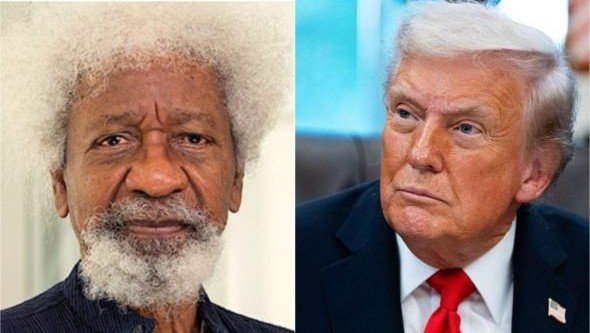Source: Africa Publicity
Nigerian Nobel Laureate Wole Soyinka has come under criticism for what many observers describe as a glaring contradiction in his long-standing public stance on terrorism and government accountability in Nigeria, following his sharp condemnation of U.S. President Donald Trump’s threat of military intervention in Nigeria over mass killings and persecution of Christians.
Soyinka, reacting to Trump’s recent comments on alleged killings of Christians in Nigeria, scolded the U.S. President for his approach.
“You don’t just open your mouth and say, ‘I’m coming to help you whether you like it or not”, Soyinka told journalists in Nigeria.
He further attacked Trump’s tone:
“With poor, almost non-existent analysis, you say you are coming with ‘guns blazing.’ At least respect those finding solutions to this unacceptable situation,” Soyinka said while blasting the U.S. president for threatening unilateral military action.
What did Trump say?
Trump had posted on November 1, 2025, on his Truth Social account:
“If the Nigerian Government continues to allow the killing of Christians, the USA will immediately stop all aid and assistance to Nigeria, and may very well go into that now disgraced country, ‘guns-a-blazing,’ to completely wipe out the Islamic Terrorists who are committing these horrible atrocities.”
The U.S. leader added: “I am hereby instructing our Department of War to prepare for possible action. If we attack, it will be fast, vicious, and sweet, just like the terrorist thugs attack our CHERISHED Christians!”
Double Standard
Soyinka’s latest remarks have, however, revived debate over his previously tough stance on Nigerian leaders who failed to tackle terrorism — a stance many now argue contradicts his rebuke of Trump.
Soyinka’s 2015 Position Resurfaces
In February 2015, during an interview with the BBC, Soyinka was one of the most vocal critics of then-President Goodluck Jonathan over the abduction of more than 200 schoolgirls in Chibok. At the time, he forcefully blamed Jonathan’s government, stating:
“What happened was a clear failure of leadership – a slow reaction, an inadequate reaction and response.”
Soyinka argued that while Boko Haram’s roots predated Jonathan’s presidency, responsibility still rested with the government for failing to act decisively.
That forceful demand for accountability and urgent action on terrorism now stands in contrast with his strong disapproval of Trump’s threat to use force against jihadist groups in Nigeria. Critics say Soyinka’s current posture appears to defend the same Nigerian leadership he once accused of negligence in the face of mass abductions and extremist violence.
Nigeria Again Battling Waves of Killings and Abductions
Soyinka’s comments come at a time when Nigeria is witnessing yet another surge in terrorist attacks, including killings of Christians, kidnappings, and coordinated assaults on schools.
Recent incidents include the attack on a church in Eruku Community, where worshippers were killed by gunmen, heightening fear among Christian communities in parts of the country.
Only days ago, on November 21, 2025, armed bandits stormed St. Mary’s Private (Catholic) Secondary School in Papiri, Agwara LGA, abducting 303 students and 12 teachers from their hostel around 2:00 a.m. as confirmed by the Christian Association of Nigeria (CAN).
Nationwide, escalating attacks have forced the Federal Government of Nigeria to shut down 47 unity colleges, citing the need to prevent further mass kidnappings.
Hypocrisy or Evolution?
Critics argue that Soyinka’s condemnation of Trump’s threat — despite the worsening conditions in Nigeria — stands in contrast to his past insistence on urgent and decisive action against terrorism. In 2015 he castigated the government for not doing enough. Today, he appears to berate a foreign leader for threatening to do too much.
The contradiction has revived debate over whether Soyinka’s position reflects political selectivity, evolving principles, or a deep mistrust of foreign involvement in Nigerian security issues.
What remains clear is that Nigeria continues to face deadly waves of violence — the same kind of violence Soyinka once said demanded bolder leadership and faster responses. Now, as global attention turns again to the country’s security crisis, his latest remarks have placed him at the center of a renewed controversy over how Nigeria should confront terrorism and who should be allowed to intervene.








